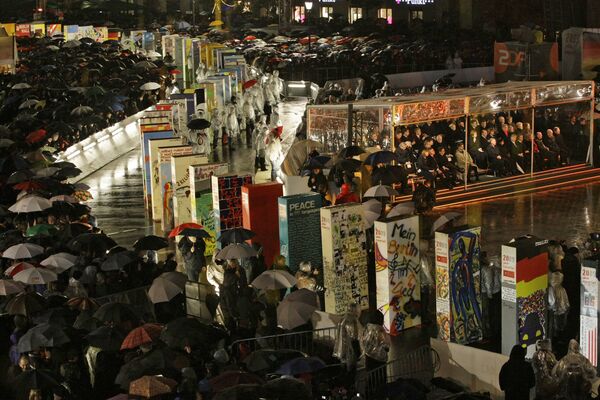Germany marked the 20th anniversary of reunification on October 3. Enough time has passed for it to be possible to consider the successes and challenges encountered over that period. How successful was the process? Where did the main achievements lie and what problems were encountered? Historian Alexei Fenenko, lead researcher at the Russian Academy of Sciences' Institute of International Security Studies discusses these questions and other important aspects of the issue in an interview with Samir Shakhbaz, RIA Novosti.
Question: Mr Fenenko, good afternoon. October 3 will mark the anniversary of German reunification, a landmark event of global proportions. Could you share your opinion as to its progress to date? How successful has it been, and is it boosting stability or creating more problems?
Answer: The facts of German reunification are indeed very interesting: the Berlin Wall fell in 1989, but the country was not reunited until October 1990. It took a whole year because it was not Germany’s problem alone, but involved all the victorious countries of World War II.
There were two proposed options for reunification: the “two plus four” scenario, where the two Germanies would meet to work out the terms of reunification with the four victorious powers joining them later, and then there was “four plus two,” which would see the four powers work out a plan for reunification to be joined later by the two Germanies, East and West.
Britain and France were staunch supporters of the four plus two option. They were overly concerned for the future of newly reunified Germany. The George Bush administration assumed a neutral stance because the United States was eager not to spoil relations with West Germany, and only Russia’s Mikhail Gorbachev supported the two plus four scenario at the meeting in Zheleznogorsk in summer 1990. It was at that meeting that the two plus four scheme was approved. America threw its weight behind the idea and pressured France and Britain to accept it as well.
The Two Plus Four Agreement (Treaty on the Final Settlement With Respect to Germany), signed in Moscow on September 12, 1990, resolved most of the problems. The agreement fully restored Germany’s sovereignty, while the victors renounced all rights to German territories, so long as Germany agreed its internationally recognized borders in Europe. However, two problems remained. First, the Moscow agreement was not legally a peace treaty. In fact, to this day neither Russia nor the other victors have signed a peace treaty with Germany. Second, four limitations on Germany’s sovereignty remained from the 1952 Bonn treaty: it could not hold a referendum on military issues, nor could it demand a withdrawal of the coalition forces before a peace treaty had been signed, it was also barred from taking major decisions without prior agreement with the four powers and from developing weapons of mass destruction. All these limitations are still in effect, formally, as the Moscow agreement did nothing to revoke them.
Question: But why? Hasn’t the time come to sign a peace treaty at last?
Answer: I remember how Britain and France feared Germany in the early 1990s. It should suffice to recall a few interesting facts from Germany’s most recent history. When Yugoslavia disintegrated in 1991, Germany unilaterally recognized Slovenia and Croatia as independent states. France and Britain disagreed with that decision, but Germany responded by raising the prospect of its withdrawal from the European Community. After that, Paris and London made every effort to persuade the U.S. President Bill Clinton to retain, at all costs, the U.S. military presence in Germany in order to exert some control on that country’s policies.
Question: Is Germany such a serious military force today?
Answer: Let us consider the situation from a different perspective. Germany is technologically in possession of the entire nuclear fuel cycle, so it [developing nuclear weapons of its own] is only a matter of making a political decision. This is not merely guesswork: two former German defense ministers openly said that Germany could do it in certain conditions. And another thing: Germany also has the technological potential to upgrade its conventional forces. Thirdly, Germany has its sights set on securing a permanent seat in the UN Security Council, and both Russia and the United States said they would support its initiative. All five permanent members are legitimate nuclear powers. If Germany becomes a member, what will happen to its nuclear status? Let me remind you that the Moscow agreement was only a preliminary document, not a peace treaty. In theory, Berlin is perfectly entitled to sit down and discuss its international political commitments.
Question: What about the U.S. military presence in Europe and particularly in Germany?
Answer: This issue has grown to dominate the European security agenda in the past two years. In April 2009, the German parliament adopted recommendations drafted by Angela Merkel’s Cabinet and proposed that a withdrawal of U.S. tactical weapons from Germany be considered. That proposal was important in several ways. Firstly, U.S. nuclear weapons have been deployed in Germany since 1957 as part of America’s security umbrella. If Germany does not want or need the U.S. nuclear weapons anymore, it also means it neither wants nor needs American security guarantees. The obvious conclusion would be that Germany is planning to develop its own defense policy.
Secondly, if Berlin does want to consolidate its military independence, it would have to raise the issue of a full-fledged peace treaty; this issue is under regular discussion in Germany. Here, the United States insists on maintaining a common NATO nuclear policy, pointing out that deployment of U.S. tactical weapons is NATO’s prerogative.
In reality, this policy is aimed at preserving control over Germany. In this regard, I can tell you that Germany needs Russia, because they know that Russia, of all the WWII winners, would be willing to discuss a peace treaty one of these days.



